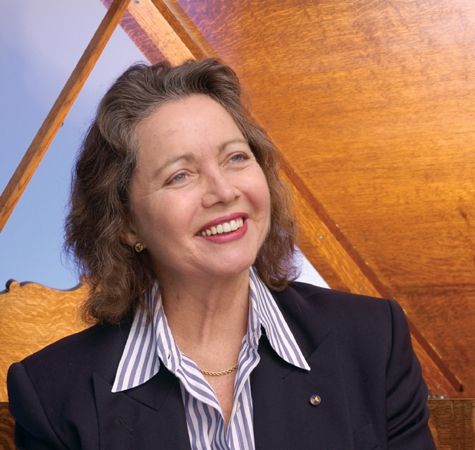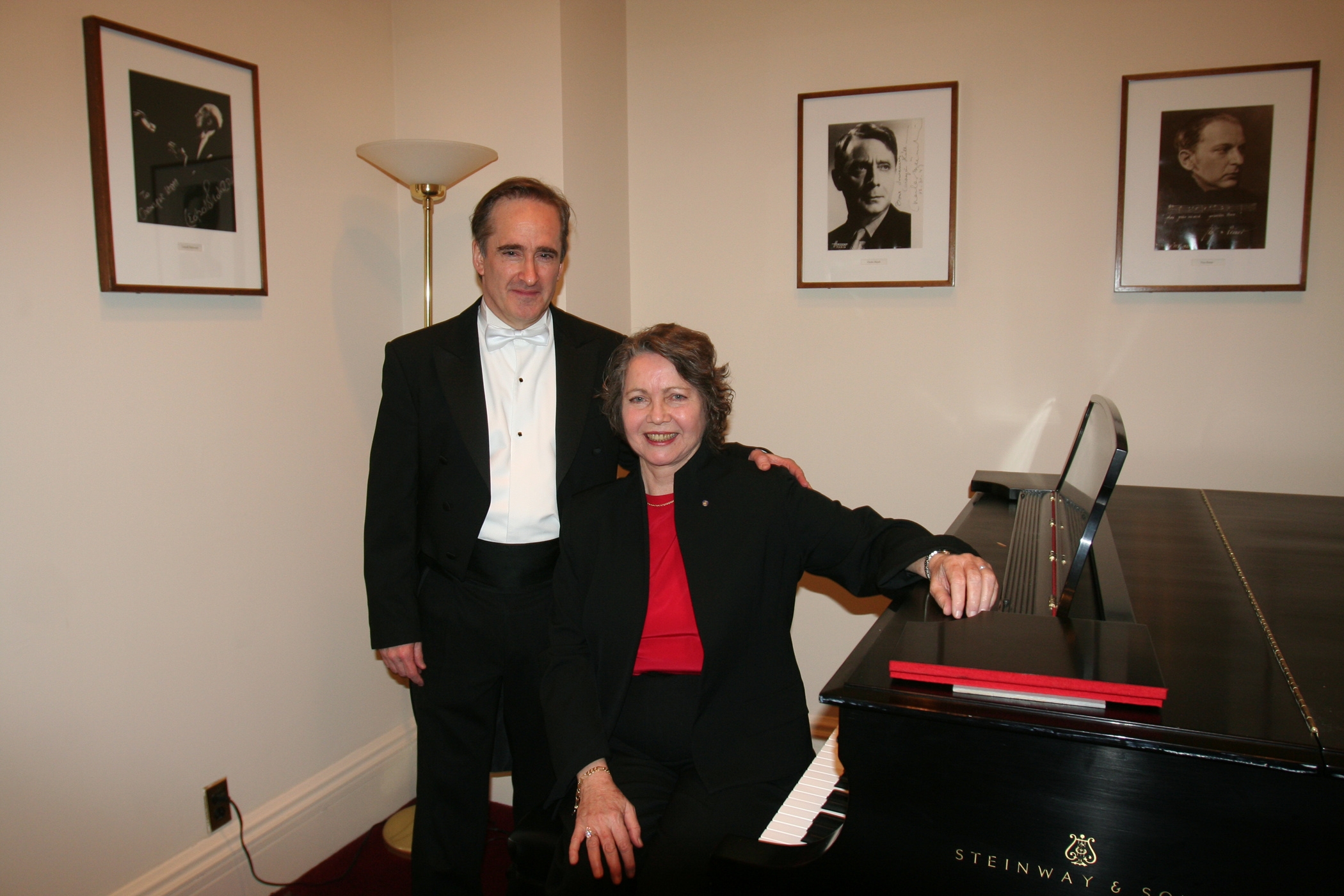At 70 (no, really), Ellen Taaffe Zwilich remains as energetic and youthful as her music

The first woman to win the Pulitzer Prize in Music will turn 70 on April 30, a significant anniversary that most people would probably find difficult to believe. Ellen Taaffe Zwilich remains a strikingly youthful presence, with her sparkling blue eyes, ever-present smile and good cheer.
And while the birthday season of the celebrated American composer is being completely ignored by music institutions in her Miami birthplace, Zwilich’s anniversary is being feted in appropriate style where it counts.
Her Fifth Symphony premiered at Carnegie Hall last October, conducted by James Conlon. Several new recordings of her music have been released or are in the pipeline. There are numerous performances across the country to mark the occasion, including Tuesday night when Zwilich’s new Septet, will be unveiled at the 92nd Street Y by the Kalichstein Laredo Robinson Trio and the Miami String Quartet. The two ensembles will reprise the Septet on Wednesday before taking it to the Kennedy Center in Washington.
“I don’t feel it,” says Zwilich of her impending birthday. “Suddenly you turn around and there are all these candles on the cake. It’s like, ‘Hey, where did they all come from?!'”
“But I’ve worked very hard for many, many years and it’s just kind of nice to feel that you’re at the top of your game. And,” she adds with a laugh, “that people are celebrating your ancient status.”
It’s characteristic of Zwilich (pronounced SWILL-ik) to approach life with good humor, even in the face of a severe accident last month. While reaching for a broken glass, Zwilich sliced the nerve and tendon of the little finger in her right hand, an intensely painful injury that she has faced with characteristic pluck, even though the rehabilitation prevented her from attending recent performances of her music in Detroit.
“It’s been a longer process than one would like,” she says. “Golly, I never realized how many things you need two hands to do. My handwriting looks like, ‘Daddy, can I have a pony’?”
Zwilich’s witty, unpretentious personality belie her determination and toughness, qualities necessary for a female composer to make her way in a male-dominated profession, particularly three decades ago when a woman composer was still viewed as something of an eccentric novelty.
Zwilich has been remarkably prolific. She has written in all genres except opera, and created a significant, extensive body of work, averaging more than one new composition a year since she “started counting” in 1971.
Her music covers a dizzying range and draws on a wide array of offbeat instrumentation, encompassing everything from a Fantasy for solo harpsichord to her 2007 Quintet for Alto Saxophone and String Quartet.
Her output includes five symphonies—her First won the Pulitzer in 1983—choral music, a song-cycle and ballet, several chamber works and many concertos, including works for such unlikely solo protagonists as bass trombone and another for five percussionists.
Not many living classical composers were spotlighted in the Peanuts comic strip—a serendipitous event that led to a friendship with cartoonist Charles Schultz and, eventually, the creation of Zwilich’s charming Peanuts Gallery for children’s concerts, a work documented in a PBS special. (Zwilich, who has been married for the last 16 years to Erik LaMont, has no children herself.)
Unfailingly articulate, Zwilich is less precise in describing her own music and sees the act of composition as something of a mystery. While she acknowledges her music has changed over the years, it hasn’t been a conscious effort, but rather something that happens through working out formal problems and seeing where the compositional process takes her.
“I think it’s become more open and more free,” says Zwilich of her music. “There’s always these little elements of surprise. One is always evolving. But I don’t think anybody writes music to exemplify a particular style or something. It’s just a basic human need that arises in some people to write music.”
“That’s the interesting thing about it. [Composing] isn’t a craft that you learn and then you’ve mastered that and you do it. You’re always learning new things.”
Zwilich’s music is concise and never outstays its welcome—her Symphony No. 1 spans less than twenty minutes. She loves the use of unusual instrumentation—vibraphone, tuba, bass clarinet, bells—-yet it never seems like mere dabbling for effect, with the offbeat resources always woven into the musical architecture and flow.
That linear quality is an essential element for Zwilich. “I’m always interested in overall form and the line of a piece,” she says. “The formal evolution is very important to me. And having something come together and have an expressive component is what I feel really good about.”

That unity is always evident in her music, along with an individual orchestration and palette. Yet Zwilich’s music is never lightweight or merely colorful. Indeed, its dynamism and rhythmic insistence reflect her tenacity and toughness beneath the surface amiability. There is a driving intensity and explosive quality in her String Quartet No. 2, a spare eloquence in the Third Symphony, and a brooding, darkly impassioned landscape in her inexplicably neglected Violin Concerto.
Zwilich’s versatility, expressive depth and prolific oeuvre make it all the more disappointing that her 70th is being ignored in the city of her birth, with even such usually forward-looking entities as the New World Symphony and Frost School of Music failing to program a single work this season. (Her Septet will be heard at the Kravis Center in West Palm Beach next year.)
Yet, with two New York premieres and a slew of concerts elsewhere, Zwilich is not at all bothered by the lack of local performances. “Look, I knocked around a long time,” she says. “I think more people are hurt by success at a young age than failure. I worked really hard and I think my music is very good.
“But, mostly, I just feel fortunate. I don’t think that anything should be coming to me; I don’t have a feeling of entitlement. And I think that’s a much healthier way to look at it.”
Musicians are clearly enthusiastic and enjoy performing Zwilich’s music, which is not always the case with attention to new works, which often have a somewhat ceremonial and even obligatory feeling.
“It’s a fantastic quintet,” says sax player Erik Ronmark, who recently performed Zwilich’s Quintet for Saxophone and String Quartet on a three-city tour with the Pacifica Quartet. “What’s interesting is that it really is a quintet. It’s not like I’m the soloist. A lot of composers fall into the trap of being too technical with the instrument. What I like is it’s very lyrical and well written for the saxophone and the textures are gorgeous.”
“I was blown away by the sparkle and life of her music,” said cellist Sharon Robinson, a friend and colleague for over two decades, for whom (with violinist Jamie Laredo and pianist Joseph Kalichstein)—Zwilich has written her Piano Trio—which is becoming a repertory work—and the Double and Triple Concertos.
Robinson said it was the vivacity and energy of Zwilich’s music that impressed her immediately even before she met the composer. “It’s got such joie de vivre,” says Robinson. “It embraces life yet it’s not light. It’s honest, serious music with a message and it always comes from the heart,” says Robinson.
Robinson also appreciates Zwilich’s practical experience as a violinist and trombone player, which contributes to her empathy with performers. “She’s a violinist, so she really writes well for strings. She knows to employ the open strings, when to go up on the C string to get a husky sound. As performers, it’s the kind of music we can really identify with.”
Ellen Zwilich looks back with real fondness on her early years as a teenage musician in Florida. Her formative musical experience took place at Coral Gables High School, which she attended before moving on to Florida State University and eventually, Juilliard, where she studied under Elliott Carter and Roger Sessions, while playing under Leopold Stokowski in the American Symphony Orchestra.
“When I was at Coral Gables High School there were three music teachers, a chorus and concert band,” she recalls. “We had an all-city band and orchestra. People could really play! Not that everyone went out and had a music career but their lives were enriched by participating in it.”
Though she would like to be more optimistic about the future of classical music in South Florida, Zwilich—who remains a seasonal Pompano Beach resident—is concerned about the impermanence of local institutions, be it the newly interred Concert Association of Florida or the Florida Philharmonic Orchestra, which, under James Judd, frequently championed her music.
“The sad thing that I’ve seen over the years is that the roots are not deep,” says Zwilich. “Many an organization has come to a demise because one person died or left. The roots are very shallow.”
With so much music in so many genres, the composer says it is difficult for her to pick favorites, yet she is very satisfied with her most recent efforts, the Symphony No. 5 and Septet. “I think those are two of my strongest pieces,” says Zwilich, who, again, expresses wonder at the mystery of the creative process, and immense gratitude that she has been able to ply her trade successfully for so many years.
“It’s something that comes out of your entire being,” she says of composition. “It comes out of your gut, the kinesthetic responses, the feelings and vibration in the air. It comes out of your imagination, your mind, your cognition, it comes out of your heart and soul.
“I think that’s the most wonderful thing. And that’s why, at my age, I still feel like a kid in a candy shop, that I’m able to do this.”
[Note: This article originally appeared on South Florida Classical Review.]
Posted in Articles




